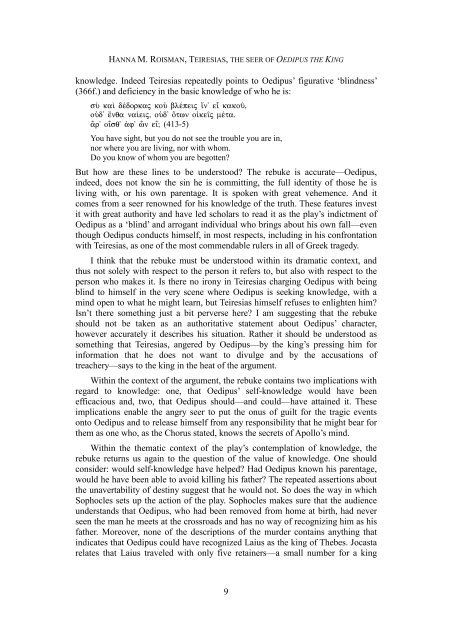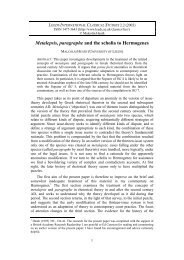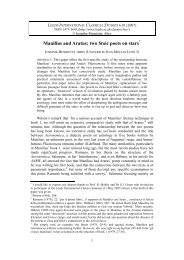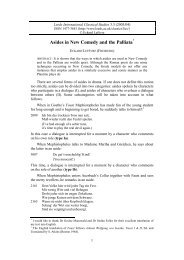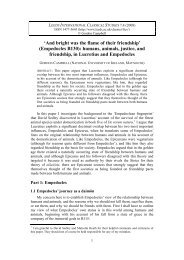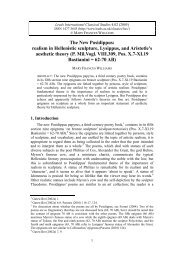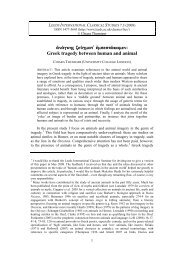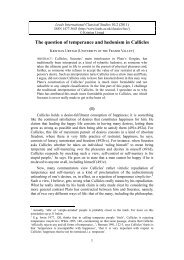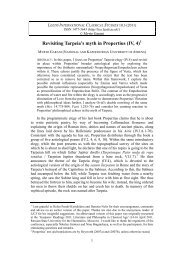Teiresias, the seer of Oedipus the King - Leeds International ...
Teiresias, the seer of Oedipus the King - Leeds International ...
Teiresias, the seer of Oedipus the King - Leeds International ...
Create successful ePaper yourself
Turn your PDF publications into a flip-book with our unique Google optimized e-Paper software.
HANNA M. ROISMAN, TEIRESIAS, THE SEER OF OEDIPUS THE KING<br />
knowledge. Indeed <strong>Teiresias</strong> repeatedly points to <strong>Oedipus</strong>’ figurative ‘blindness’<br />
(366f.) and deficiency in <strong>the</strong> basic knowledge <strong>of</strong> who he is:<br />
sÝ kaˆ dšdorkaj koÙ blšpeij †n' e kakoà,<br />
oÙd' œnqa na…eij, oÙd' Ótwn o„ke‹j mšta.<br />
«r' osq' ¢f' ïn e; (413-5)<br />
You have sight, but you do not see <strong>the</strong> trouble you are in,<br />
nor where you are living, nor with whom.<br />
Do you know <strong>of</strong> whom you are begotten?<br />
But how are <strong>the</strong>se lines to be understood? The rebuke is accurate—<strong>Oedipus</strong>,<br />
indeed, does not know <strong>the</strong> sin he is committing, <strong>the</strong> full identity <strong>of</strong> those he is<br />
living with, or his own parentage. It is spoken with great vehemence. And it<br />
comes from a <strong>seer</strong> renowned for his knowledge <strong>of</strong> <strong>the</strong> truth. These features invest<br />
it with great authority and have led scholars to read it as <strong>the</strong> play’s indictment <strong>of</strong><br />
<strong>Oedipus</strong> as a ‘blind’ and arrogant individual who brings about his own fall—even<br />
though <strong>Oedipus</strong> conducts himself, in most respects, including in his confrontation<br />
with <strong>Teiresias</strong>, as one <strong>of</strong> <strong>the</strong> most commendable rulers in all <strong>of</strong> Greek tragedy.<br />
I think that <strong>the</strong> rebuke must be understood within its dramatic context, and<br />
thus not solely with respect to <strong>the</strong> person it refers to, but also with respect to <strong>the</strong><br />
person who makes it. Is <strong>the</strong>re no irony in <strong>Teiresias</strong> charging <strong>Oedipus</strong> with being<br />
blind to himself in <strong>the</strong> very scene where <strong>Oedipus</strong> is seeking knowledge, with a<br />
mind open to what he might learn, but <strong>Teiresias</strong> himself refuses to enlighten him?<br />
Isn’t <strong>the</strong>re something just a bit perverse here? I am suggesting that <strong>the</strong> rebuke<br />
should not be taken as an authoritative statement about <strong>Oedipus</strong>’ character,<br />
however accurately it describes his situation. Ra<strong>the</strong>r it should be understood as<br />
something that <strong>Teiresias</strong>, angered by <strong>Oedipus</strong>—by <strong>the</strong> king’s pressing him for<br />
information that he does not want to divulge and by <strong>the</strong> accusations <strong>of</strong><br />
treachery—says to <strong>the</strong> king in <strong>the</strong> heat <strong>of</strong> <strong>the</strong> argument.<br />
Within <strong>the</strong> context <strong>of</strong> <strong>the</strong> argument, <strong>the</strong> rebuke contains two implications with<br />
regard to knowledge: one, that <strong>Oedipus</strong>’ self-knowledge would have been<br />
efficacious and, two, that <strong>Oedipus</strong> should—and could—have attained it. These<br />
implications enable <strong>the</strong> angry <strong>seer</strong> to put <strong>the</strong> onus <strong>of</strong> guilt for <strong>the</strong> tragic events<br />
onto <strong>Oedipus</strong> and to release himself from any responsibility that he might bear for<br />
<strong>the</strong>m as one who, as <strong>the</strong> Chorus stated, knows <strong>the</strong> secrets <strong>of</strong> Apollo’s mind.<br />
Within <strong>the</strong> <strong>the</strong>matic context <strong>of</strong> <strong>the</strong> play’s contemplation <strong>of</strong> knowledge, <strong>the</strong><br />
rebuke returns us again to <strong>the</strong> question <strong>of</strong> <strong>the</strong> value <strong>of</strong> knowledge. One should<br />
consider: would self-knowledge have helped? Had <strong>Oedipus</strong> known his parentage,<br />
would he have been able to avoid killing his fa<strong>the</strong>r? The repeated assertions about<br />
<strong>the</strong> unavertability <strong>of</strong> destiny suggest that he would not. So does <strong>the</strong> way in which<br />
Sophocles sets up <strong>the</strong> action <strong>of</strong> <strong>the</strong> play. Sophocles makes sure that <strong>the</strong> audience<br />
understands that <strong>Oedipus</strong>, who had been removed from home at birth, had never<br />
seen <strong>the</strong> man he meets at <strong>the</strong> crossroads and has no way <strong>of</strong> recognizing him as his<br />
fa<strong>the</strong>r. Moreover, none <strong>of</strong> <strong>the</strong> descriptions <strong>of</strong> <strong>the</strong> murder contains anything that<br />
indicates that <strong>Oedipus</strong> could have recognized Laius as <strong>the</strong> king <strong>of</strong> Thebes. Jocasta<br />
relates that Laius traveled with only five retainers—a small number for a king<br />
9


